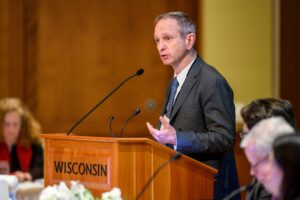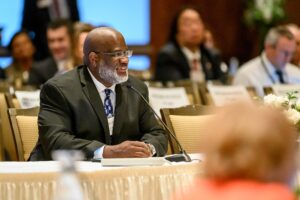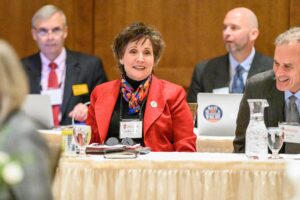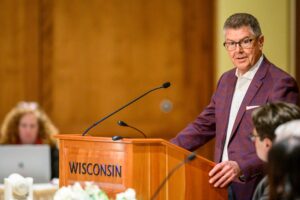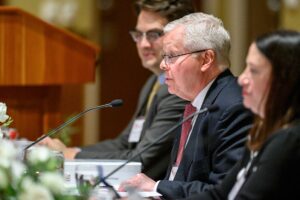
UW System President Jay Rothman addresses the Board of Regents at its February 2023 meeting hosted by UW-Madison. (Photo by Althea Dotzour / UW–Madison)
MADISON, Wis. – University of Wisconsin System President Jay Rothman told the Board of Regents today that the UW System’s recently released free speech survey reflects a key initiative of the strategic plan, a commitment to “foster civic engagement and serve the public good.”
“We undertook the survey to determine the climate on our campuses surrounding freedom of expression and students’ understanding of the First Amendment,” Rothman said. “These are important topics for any institution of higher education.”
He said universities must be “marketplaces of ideas,” where students are exposed to various ideas and perspectives that will help them improve their ability to think critically and creatively, to analyze issues thoughtfully, and to ascertain the accuracy of available information.
“These skill sets are important to our long-term economic prosperity, the advancement of knowledge, and the viability of our democracy,” Rothman said.
He added that civil dialogue does not mean that all will agree. Rather, “we must model that it is acceptable to agree to disagree.”
“Our universities need to be models of civil dialogue, where critical ideas are debated passionately, vigorously, and civilly,” Rothman said. “The challenges facing our state, our nation, and our world are complicated and nuanced … They must be discussed and debated to find viable solutions. We must be able to probe deeply and, in good faith, ask questions without fear of being labeled or marginalized. It is essential that we promote an environment in which people can express their views.”
Rothman said he will facilitate civil dialogue on campus by meeting with students across the UW System as part of “It’s Just Coffee” events, with the first one being held last week at UW Oshkosh. The events are modeled after a concept originally started by a UW-Madison student to promote more conversations among students of different views and backgrounds. “I thought it was a terrific idea and I want to expand it across the System,” Rothman said.
Rothman also told Regents he is asking university leaders to review their institution’s public engagement around the issues of free speech and free expression. “If it’s not robust, let’s make it robust,” he said.
UW-Madison is “Enhancing Excellence, Overcoming Obstacles, Pursuing Partnerships”
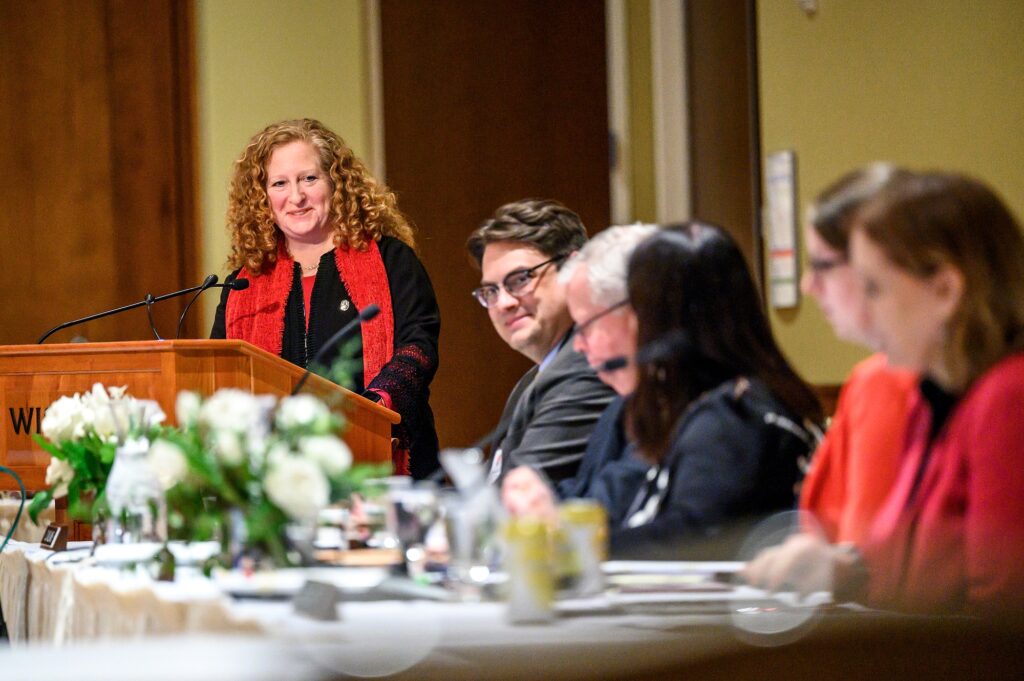
Chancellor Jennifer Mnookin delivers a speech during the UW Board of Regents meeting hosted at Union South at the University of Wisconsin–Madison on Feb. 9, 2023. During the speech, Mnookin announced the creation of Bucky’s Pell Pathway. (Photo by Althea Dotzour / UW–Madison)
In a full Board presentation, “UW-Madison: Enhancing Excellence, Overcoming Obstacles, Pursuing Partnerships,” UW-Madison Chancellor Jennifer L. Mnookin told Regents the university is thriving across many dimensions, but that its excellence can’t be taken for granted.
“UW-Madison needs to be protected and nurtured – not only for the good of the university, but for the good of our great state of Wisconsin,” Mnookin said. “At the same time, if we work together, in effective partnership, I am confident that we can not only maintain our great strengths, but we – and the entire UW System – can be better tomorrow than we are today.”
Mnookin said the university faces obstacles in five key areas that need to be overcome to maintain, and build on, its excellence, including modernizing aging facilities; ensuring students can thrive as learners and community members; growing research further through more expansive partnerships and greater engagement with industry; and advocating for increased state investment and flexibilities that will allow the state’s flagship university to operate more efficiently and effectively.
Mnookin discussed how future success will depend on partnerships – external partnerships with industry, government, and other academic institutions, as well as cross-disciplinary partnerships within UW-Madison and across the UW-system.
At the same time, Mnookin said there is lots of good news to share:
- UW-Madison received a record-setting 60,000-plus applications for Fall 2023.
- Diversity of the student body, long a goal of UW-Madison, continues to improve. After welcoming the most racially diverse freshman class in its history last fall, UW-Madison saw an 18% increase in applications from students of color for the next freshman class.
- UW-Madison welcomed 168 new faculty last year, the second highest number in more than a decade.
- And the university maintains a position in the Top 10 of many rankings of the best public universities, as well as in research expenditures.
“Both here in our great state and all across the country, many young people, and their families, recognize that very exciting things are happening here at Wisconsin,” Mnookin said.
“There is an amazing version of our future, where education, research, and outreach all flourish in an innovation ecosystem built on partnerships that are broad and deep, to the benefit of our students, our university, and our state,” Mnookin said. “This is an achievable future, but it is not an inevitable one. And it depends on all of us.”
To close her address, Mnookin announced Bucky’s Pell Pathway (BPP), a program to provide UW-Madison’s Pell-eligible, Wisconsin resident students a pathway to complete their four-year degree without debt to cover educational expenses. The university expects more than 800 incoming students will be eligible in the upcoming year.
“(Bucky’s Pell Pathway) is an important additional step in creating opportunities and access here at UW-Madison and helping to ensure that the amazing resources of our university offer transformative possibilities to talented students from all across our state, regardless of their means,” Mnookin said.
The program will be funded by institutional, private, and external sources. No state tax dollars will be used, she said.
BPP builds on the success of Bucky’s Tuition Promise (BTP), which has benefited nearly 5,000 students. Mnookin also announced that the eligibility threshold for household income for Bucky’s Tuition Promise will be raised from $60,000 to $65,000, meaning even more Wisconsin students will qualify.
“If we’re going to live our values of creating real access and opportunity, we need to do more for our students from Wisconsin’s lowest-income households – our Pell grant recipients,” she said.
See the full text of Chancellor Mnookin’s address.
UW System answers the question: Why College?
At a time when the value of a college degree is being questioned in some circles, Ben Passmore, UW System Associate Vice President of Policy Analysis and Research, says the data indicates UW students are generally satisfied with their educational experience and how it has prepared them for the workforce.
UW System bachelor’s degree-holders consistently have post-graduation earnings that outpace Wisconsin’s median annual earnings, even one year after graduation and the spread continues to grow after that. And UW graduates tend to work for many of Wisconsin’s top employers. “Our students are filling the critical roles our state needs,” Passmore said.
- See the UW System PowerPoint, “Why College? Positioning Our Public Universities to Best Serve Wisconsin”
Almost 87% of UW graduates have full-time employment since earning their degree. About 73% of UW System graduates say their bachelor’s degree helped prepare them for their career – slightly ahead of the national average (72%).
According to about 56% of UW graduates, one area where students believe universities could provide more help is understanding career opportunities. “We’re not doing worse than anyone else but I have to think there might be room for improvement here,” Passmore said.
“Our students are cost-sensitive,” Passmore said. “They get this is a big investment and they are concerned about that.” He noted that it now takes 6.5 years to recoup their education investment, versus three years in 2002. Still, 61% of UW graduates believe their experience was worth the cost (versus 56.7% nationally).
The UW System is doing things to ensure most students are satisfied, Passmore said, including making education more affordable, providing proactive student support and high-impact practices, and developing academic programs that meet the interests and demands of both students and employers.
Finally, Passmore also pointed out that nearly 90% of Wisconsin resident UW graduates remain in Wisconsin five years after graduation. “This is something that has real impact,” he said.
Board welcomes new colleagues
The Board of Regents welcomed Dr. Joan Prince who was recently appointed to the Board by Governor Evers to fill the vacancy created by the resignation of Regent Tracey Klein.
The holder of four degrees from UW-Milwaukee, Dr. Prince served as that university’s Vice Chancellor of Global Inclusion and Engagement and as an associate professor in biomedical sciences from 2000 to 2021.
The board also welcomed Dr. Corey King, the incoming 18th Chancellor at UW-Whitewater. Dr. King, who starts in his new role on March 1, is currently Vice Chancellor for Inclusivity and Student Affairs at UW-Green Bay.
President Rothman also expressed his gratitude to Dr. John Chenoweth for stepping up to lead UW-Whitewater as interim Chancellor during the transition period.
Regent President’s Report
Regent President Karen Walsh updated the board on the chancellor search currently underway at UW-Platteville, noting the Search and Screen Committee chaired by Regent Cris Peterson will conduct interviews with semifinalist candidates next week. Finalist candidates are expected to visit the university in late March, and a recommendation for the next chancellor brought before the board later this spring.
With the recent announcement of UW-Parkside Chancellor Debbie Ford stepping down to accept a new position at Indiana University Southeast, Walsh said a Search and Screen committee is being identified. Regent Kyle Weatherly will chair that committee, with Regents Héctor Colón, John Miller, Ashok Rai, and Jennifer Staton also serving. President Rothman is currently working with members of shared governance at UW-Parkside to identify the full committee.
Walsh also reminded Regents to “hold the date” on Wednesday, March 8, for this year’s 18th annual Research in the Rotunda event, a celebration and display of undergraduate research. Research in the Rotunda is considered the UW System’s signature and most significant outreach event.
System President’s Report
In his regular report to the Board, President Rothman noted that the tactical steps to be taken over the next six to nine months to implement the new strategic plan have now been defined. One example from the area of enhancing the student experience and driving enrollment are the initiatives related to dual enrollment, direct admissions, and international students already being spearheaded by Johannes Britz, senior vice president for academic and student affairs.
As part of the UW System’s commitment to build strong relationships with key stakeholders, Rothman told Regents a series of meetings with state legislators is taking place to discuss the strategic plan, the impact UW universities have on their communities, and how the five-year plan supports the Board’s budget request.
Rothman said he is also meeting with members of the business community, including Amy Pechacek, the Department of Workforce Development secretary-designee, as well as the Waukesha County Business Alliance to discuss how the UW can strengthen the talent pipeline that employers in the state want and need.
At the federal level, Rothman noted that there are ongoing productive conversations with members of the Wisconsin delegation.
Finally, Rothman recognized several significant accomplishments around the System, including a $10 million gift from the Sentry Insurance Foundation to UW-Stevens Point’s School of Business & Economics. The donation is the largest one-time gift in Sentry Insurance Foundation’s history and the largest the university has ever received.
Rothman also recognized UW Oshkosh’s Hmong Studies director Mai See Thao for being named an emerging scholar by Diverse Issues in Higher Education. Thao, who began work in fall 2020 as UWO’s inaugural Hmong Studies director, obtained full approval for the Hmong Studies certificate in just her second year on the faculty. The certificate helps position UWO as a national leader in the field of Hmong Studies.
Regents recognize service of a former colleague
On behalf of the Board, Regent Scott Beightol presented Regent Emeritus Andrew S. Petersen with a resolution of appreciation for his service.
“Looking back at the last three years and what we’ve done as a board and as a leading higher education institution, it has been remarkable,” Petersen said.
Pointing to the retirement of former System President Ray Cross, the unprecedented COVID pandemic, and an increasingly partisan legislature, Petersen said he’s proud of what the board accomplished. “Those were some pretty dark and disturbing days,” he said, “and I think of all the adversity we faced and the successes we generated.”
Petersen served as an ex officio member of the Board of Regents from 2013 to 2015 – while president of the Wisconsin Technical College System Board of Directors – and then as a gubernatorial appointment for a seven-year term, including two years as Board of Regents president (2019 to 2021) and two years as vice president (2017 to 2019).
Petersen said he’s proud of how the UW System and its universities successfully navigated the pandemic with significant help from federal dollars, while also making the case for investing more aggressively in supporting student mental health.
“This board in my opinion needs to continue to mobilize the business community across Wisconsin to lobby legislators to demand meaningful investments in this university,” Petersen said. “The UW System is one of the best investments policymakers can make.”
“I’m incredibly proud of the forward progress that we’ve made,” Petersen said.
Business and Finance Committee
The Business and Finance Committee approved three separate agreements on behalf of UW-Superior and its Lake Superior Research Institute, which was awarded federal funding for the evaluation of ballast water treatment technologies.
In the first two agreements, Algoma Central Corporation is the subgrantee, carrying testing equipment on two of its vessels. One project will research the effectiveness of a chemical technology in treating ballast water; the other focuses on an ultraviolet treatment solution. These agreements are valued at $1.9 million and $1.1 million, respectively.
The third agreement is with The Interlake Steamship Company, at a project budget of $2.1 million. The research aboard their vessel will evaluate the effectiveness of filter technology in treating ballast water to current discharge standards.
In other business, the Business and Finance Committee:
- Approved the UW System Status Report on Large or High-Risk Information Technology Projects. The report, provided by Chief Information Officer Steven Hopper, details the status of 10 major IT projects within the system, including the Procure-to-Pay Automation Project, which was completed on schedule and under budget since the last report in August 2022. Other project milestones since then include completion of the Architect Phase of the Administrative Transformation Program. For other projects still in progress, the report offers updates on their schedule, scope, and budget. The total project portfolio is $251 million, a 3.2% decrease compared to the August report;
- Approved the annual report on the Strategic Plans for Major IT Projects presented by Steven Hopper. The report provides an inventory of all ongoing and new projects, both enterprise-wide and institution-specific, and includes information on each project’s business need, impact, staffing requirements, and budget. Both reports will be submitted to the Legislature’s Joint Committee on Information Policy and Technology, pursuant to state statute;
- Approved an amendment to UW System’s agreement with Huron Consulting Group to assist with implementation of Workday software related to the Administrative Transformation Program. The amendment will provide for additional professional services based on information discovered through the Planning and Architect Stages of the project, at a cost of up to $1.26 million, while removing a “platform as a service” strategy from the project’s scope;
- Approved an amendment to UW-Madison’s agreement with Huron Consulting Services, also related to ATP. The amendment represents change orders to the statement of work totaling $690,000 for additional resources specifically focused on the integration of the Huron research administration software and the Employee Compensation Compliance module; and
- Heard a presentation from host campus UW-Madison, entitled “Finance and Administrative Opportunities for UW-Madison.” Vice Chancellor for Finance and Administration Rob Cramer provided an overview of efforts by the university to generate new revenue and implement operational improvements.
Education Committee
In its preliminary report to the Board, a task force convened by UW System’s Office of Academic and Student Affairs told the Education Committee that a direct admissions program is a potentially feasible approach for the UW System.
Direct admissions is a process for universities to offer admission to students based on pre-approved criteria before a student goes through the traditional application process. The strategy has the potential to increase UW enrollment among in-state students and to address gaps in enrollment among underrepresented groups.
Current policy would allow individual pilot programs but systemwide implementation might require changes in policy regarding the UW freshmen admissions requirements and review process. It is expected that full implementation could not be completed before Fall 2025.
Critical issues for implementation identified by the task force would include data needs, addressing capacity at the UW and K-12 levels, and developing a specific timeline that accommodates recruitment and admissions work. The task force also recommended establishing clear equity goals for a direct admissions program, enhancing the current EApp to allow a better flow of information for students, and coordinated communication and reporting with high schools and students.
In other business, the Education Committee:
- Approved UW-Green Bay’s request for a Master of Science in Biodiversity Conservation and Management. The fully online program, in partnership with UW-Extended campus, will prepare graduates for careers as environmental scientists and managers, conservation scientists and directors, and geological and hydrologic technicians, among others. The four stand-alone certificates will enable students to tailor their coursework to immediately meet their career goals as they progress toward completion of the M.S. degree;
- Approved UW-Madison’s request for a Bachelor of Science-Education (B.S.E.) in Elementary Education and Special Education (EESE). Statewide and nationally, there is a shortage of teachers who are prepared to serve the needs of a diversifying student body. The B.S.E. in EESE graduates can apply for licensure to teach general education in kindergarten-9th grade and special education in kindergarten-12th grade in Wisconsin schools;
- Approved UW-Madison’s request for an Educational Specialist Degree (Ed.S) in Educational Leadership and Policy Analysis. Graduates will be eligible to apply for an administrator license through the Wisconsin Department of Public Instruction to serve as superintendents in Wisconsin schools. To increase opportunities to “provide positive social, cultural, and economic impact in Wisconsin,” the Ed.S. in ELPA program will target working professionals and students who do not want to complete a doctorate;
- Approved UW-Milwaukee’s request for a Doctor of Philosophy (Ph.D.) in Mechanical Engineering. Elevating an existing track to a stand-alone degree, the program will be a more recognizable credential and requires no new courses or faculty. Current areas of strength include renewable energy, rehabilitative robotics, power storage, tribology, optics, sensor development, structural health monitoring, and water filtration;
- Approved UW-Milwaukee’s request for a Bachelor of Architecture in Architecture. The proposed B.Arch. program is a five-year, 150-credit professional program that will enable its graduates to pursue licensure. The program is designed to save one full year of study and significant cost savings for students interested in careers as licensed architects;
- Approved UW-River Falls’ request for a Master of Science in Business Analytics. The program elevates a track in the existing Master of Business Administration (MBA) program. Full-time students will be able to complete all coursework in one fiscal year. The program adds a more technical choice to business graduate programs offered by the College and meets a need that businesses continue to communicate;
- Heard a report on recruiting and supporting international students. Facilitated by UW-Superior Provost Maria Cuzzo, the discussion included perspectives from international students and campus professionals at UW-Stevens Point, UW-Stout, and UW-Platteville, highlighting the unique experiences of these students; and
- Heard a presentation from host UW-Madison on “Adapting to Change: AI, ChatGPT, and Higher Education.” The presentation highlighted the university’s adaptations to changes in the world of technology, including sharply increasing student interest in Computer Science and, more recently, the development of new artificial intelligence tools, including ChatGPT, that promise to disrupt discovery, creation and learning.
Capital Planning and Budget
The Capital Planning and Budget Committee approved UW System’s request for authority to amend RPD 13-5 “Capital Projects Solely Managed by the UW System: Approval and Signature Authority” to clarify approval and signature authority and related responsibilities. The proposed changes would permit a Chancellor to delegate approval authority for capital projects solely managed by the UW System to other university employees providing that the Chancellor has requested and received approval for the specific delegation from the UW System President. The Chancellor’s delegation request must be developed in consultation with the UW System Office of Capital Planning and Budget. The proposed changes would also increase the threshold at which a Chancellor, or employee with delegated authority, may approve a project falling under the scope of Regent Policy Document 13-5 to up to $5,000,000, up from the current $1,000,000.
Additionally, the current policy permits the UW System President to approve the related design and construction contracts for capital projects solely managed by the UW System up to $1,000,000. Due to the volume of projects exceeding the current $1,000,000 threshold, the policy has been modified to increase this threshold to $5,000,000.
In other business, the Capital Planning and Budget Committee:
- Approved UW-Madison’s request for authority to increase the budget of the UW Managed Primate Center Backup Generator by $1,432,000 to a total project cost of $3,332,000 Gift/Grant Funds. This project upgrades electrical systems at the Primate Center, installs backup generators, and constructs a new electrical vault to serve maintenance receptacles, generator auxiliary loads, and HVAC equipment. A construction bid of $3,332,000 was received on April 6, 2022 that exceeded the original budget amount due to risks associated with current material shipping delays, and cost inflation, escalation, and supply-chain cost increases;
- Approved UW-Stout’s request for authority to sell a Single-Family Residence, exclusive of the land, located next to an existing parking lot which they plan to expand. However, prior to demolishing the house, they are offering it for sale. Interested buyers will be required to relocate the house from the property. The institution is expecting to list the house on the State of Wisconsin Surplus Property auction website;
- Approved UW System’s request for authority to revise and use Evaluation Criteria for Major Capital Project Requests. Last updated in February 2019, these criteria assist in developing a biennial capital budget request and a six-year capital plan that address the most critical needs, highest academic priorities, and most cost-effective solutions to maintain and develop each university’s physical environment. The proposed modifications address two primary shortcomings of the current evaluation criteria: consideration of net new square footage in specific but rare contexts, and demonstration of appropriate diligence and management of past capital budget funding authority and project enumerations relative to the proposed capital plan;
- Heard a presentation from host UW-Madison on “Transforming the Built Environment”. A significant number of capital projects are currently underway, however the challenge presented by aging academic and research facilities is significant and is a competitive disadvantage as peer institutions are moving faster to address facility needs in support of their missions; and
- Heard an update from UW System’s Senior Associate Vice President Alex Roe on a recent meeting of the State Building Commission as well as the 2023-25 Capital Budget request.
Audit Committee
As part of regular Division I Athletics reports to the Board, UW-Madison Athletic Director Chris McIntosh provided an overview of academic, fiscal, and compliance matters in the Badger athletics program for 2021-22.
He reported UW-Madison experienced another successful season on the playing field, headlined by the women’s volleyball team’s first ever national championship in 2021. Among other accomplishments, the football team marked its 20th straight bowl appearance, the men’s cross country team won its fourth straight Big Ten championship, and freshman swimmer Paige McKenna was crowned NCAA national champion in the women’s 1650-yard freestyle.
Badger student-athletes also scored well academically with a cumulative GPA of 3.34 at the end of Spring 2022. The Graduation Success Rate (GSR) for UW student-athletes was 91% in 2021-22, two percentage points higher than the GSR for all NCAA Division I student athletes.
As for compliance, the program reported no Level I or Level II violations (formerly classified as “major”) and 18 Level III or IV violations (formerly “secondary”) to the NCAA and Big Ten in 2021-22.
In other business, the Audit Committee:
- Heard a summary report of audit progress for the Fiscal Year 2023 Audit Plan;
- Heard a summary report of recently issued audits including a NCAA Athletics Division I Agreed-Upon Procedures Engagement report for UW-Green Bay and UW-Milwaukee, and a Recruitment and Admission of International Students Audit;
- Received an update on UW System’s 2022 cyber insurance renewal, as UW System continues to pursue longer term options and solutions to reduce cyber risk and improve operational resiliency through critical, long-term planning for its information security operations systemwide; and
- Heard a report from the Office of Compliance and Integrity on its work to revise SYS 625, Youth Protection and Compliance. The revised policy was sent to the Finance and General Administration Policy Group for the formal approval process and is routed to the UW System President for signature.
The University of Wisconsin System Board of Regents will resume its meeting at 8:45 a.m., Feb. 10, 2023, at UW-Madison.

